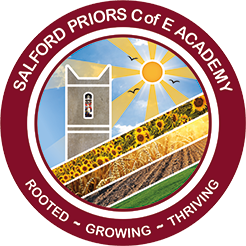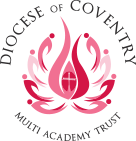Curriculum - Our Approach
Our Curriculum Overview
At Salford Priors Church of England Academy, everything we do is shaped by our Christian vision:
Rooted in love and faith, Growing in hope and courage, and Thriving in light and harmony.
We want every child to feel welcome, safe, valued and supported so that they can achieve their very best. Our curriculum is ambitious, inspiring and inclusive, giving all pupils the knowledge, skills and confidence they need to succeed in school and beyond.
What Our Curriculum Offers
Our curriculum is carefully designed to provide:
Strong foundations in reading, writing and mathematics – reading is at the heart of our curriculum, beginning with systematic phonics in Early Years and developing into a love of reading and deep comprehension across all subjects.
A broad and balanced curriculum – covering all National Curriculum subjects, Religious Education and Personal Social Health and Economic education (including Relationships and Sex Education), so that pupils gain a wide range of knowledge and experiences.
Christian values and learning qualities – our seven Christian values (love, faith, hope, courage, peace, forgiveness and generosity) and our seven learning qualities (such as resilience, curiosity and responsibility) are woven throughout daily school life.
Knowledge-rich learning – carefully sequenced lessons and knowledge organisers help children to know more and remember more, while retrieval practice ensures key knowledge is secured in long-term memory.
Inclusion for all – we have high expectations of every pupil and provide the right support so that all children, including those with special educational needs or from disadvantaged backgrounds, can thrive.
Inclusion and Equality
We are proud to be an inclusive school where every child is valued as an individual. Our curriculum is designed to raise aspirations for all pupils, including those with SEND or who are disadvantaged. Teachers use adaptive teaching, scaffolding and targeted support to ensure that all children can access learning and make progress.
We believe in equality of opportunity for every pupil regardless of background, ability, gender, race, culture or disability. All children at Salford Priors are encouraged to take part fully in every aspect of school life and to grow into confident, compassionate citizens.
Assessment and Feedback
Assessment is an important part of our curriculum and is used to support children’s learning rather than add unnecessary pressure. Teachers use a range of approaches such as questioning, retrieval activities, quizzes and short assessments to check understanding and guide the next steps in learning.
Feedback is timely, clear and purposeful – often given verbally during lessons, as well as through short written comments where appropriate. This helps children to reflect on their work, understand how to improve, and feel proud of what they have achieved.
Beyond the Classroom
We enrich the curriculum with visits, visitors and themed experiences which bring learning to life. Pupils also take part in wider opportunities such as performances, sports, creative projects and community events. These experiences help children develop confidence, teamwork and a sense of belonging.

Preparing Children for the Future
We want our pupils to leave Salford Priors not only with excellent academic progress but also as confident, caring and curious global citizens. To achieve this, we place a strong emphasis on developing the whole child and preparing them for life beyond school. Our pupils will understand the importance of faith, values and community, and be equipped with the knowledge and skills they need to make a positive difference in the world.
Communication and Self-Confidence
Pupils are explicitly taught public speaking and presentation skills so that they can express themselves clearly, listen attentively and communicate with confidence. These opportunities help to build self-esteem and enable our children to become articulate, competent communicators who are ready to contribute positively in any setting.
Resilience, Teamwork and Problem-Solving
Through our Forest School provision, pupils develop lifelong skills of resilience, teamwork and problem-solving, which extend beyond the classroom. At the same time, they foster a love and appreciation for the natural world, becoming global citizens who not only enjoy nature but also actively advocate for the preservation of the environment and natural life.
Perseverance, Discipline and Passion
In addition to high-quality Physical Education lessons, we provide extra sporting opportunities that are free to all pupils. These include activities such as fencing, cricket and non-contact boxing, giving children the chance to experience sports they may not otherwise access. Through these opportunities, pupils develop lifelong skills such as teamwork, perseverance, discipline and resilience, as well as confidence in trying new challenges. Exposure to a wide range of sports not only sparks curiosity but can also grow into lasting personal passions, healthy lifestyles or even future professional interests.

